FAYETTEVILLE — Wal-Mart Stores Inc. unveiled a $15 billion share buyback program Friday as it hammered home its message to shareholders at its annual meeting that the world's largest retailer will keep growing.
At a packed basketball arena at the University of Arkansas, CEO Mike Duke said Wal-Mart would add sales wherever it can: overseas, online, and in small towns and big cities.
"We are right in the sweet spot of the 'next-generation' customer...They're connected to the world through smart phones and social media. ... They're in charge of when they shop and how they shop. They know who has the lowest prices. But to succeed, we must also be the best at how we run our business," Duke said.
With Wal-Mart's U.S. namesake business in a two-year slump, Duke assured shareholders that the "greatest priority" is to get its revenue at stores open at least a year — a key measure of a retailer's health — to rise again.
But he said Wal-Mart continues to look for new customers around the globe — online and at its stores from China and the blue-collar suburbs of Sao Paolo, Brazil, to neighborhoods in Chicago. It's testing new services like its grocery delivery service in San Jose, Calif.
Duke's said the company has five priorities:
- Growth by adding customers, opening new stores and acquiring other retailers.
- Keeping costs low and passing the savings to customers.
- Building a global Internet business.
- Developing talent, including a greater focus on women and minorities.
- Expanding the company sustainability effort.
Wal-Mart is operating in a more difficult environment than a year ago on all fronts. Dollar stores, which have expanded their assortments, are blanketing the country, and Amazon.com's vast selection and low prices are stealing Wal-Mart's key advantages.
Meanwhile, rising gas prices and other household costs are squeezing shoppers' budgets and making it tougher to stretch their remaining dollars to the next payday. Shoppers are focusing on groceries and little else, said Bill Simon, president and CEO of its U.S. namesake business.
He noted to reporters that it's seeing the widest swing ever in spending around when shoppers get their paychecks. That's making Wal-Mart scramble harder to offer smaller packages for shoppers at the end of the month and alter its staff scheduling.
"Customers are struggling," he said.
Rising costs in commodities are also putting more pressure on Wal-Mart, which can't pass big price increases along to its already-stressed shoppers.
With revenue hitting $419 billion last year, Wal-Mart's worries matter, because it is a key barometer of consumer spending.
WALMART SHAREHOLDERS LINKS
•NWA Media's 2011 Shareholders Section •Replay: 2011 Shareholders' Meeting •Walmart's Sustainability Commitment •Northwest Arkansas Dining Guide Digital Edition •Twitter: Walmart Shareholders •More Walmart News
Wal-Mart's flagship business is still smarting from the mistakes it made on pricing and selection more than two years ago. The company has been racing to restock thousands of items, like different flavors of Cheerios, it culled as part of its overzealous bid to clean up its stores two years ago.
It's also going back to emphasizing its "Everyday Low Price" roots. Most of the groceries have been restocked, but the company said it will take the rest of the year to restock its general merchandise like clothing and home furnishings.
To fight back against dollar stores, the company is opening up to 20 Walmart Express stores this year; they're less than one-tenth the size of a supercenter, and carry essentials from groceries to general merchandise items like hammers and pre-paid phones.
But Wal-Mart's international sales, which account for 26 percent of its sales and is the company's fastest growing division, are sizzling and much of the meeting focused on the happy topic of overseas growth. Wal-Mart's approval this week for its $2.4 billion purchase of a majority share in South African retailer Massmart is a major step in its international strategy.
Meanwhile, Sam's Club, which accounts for about 12 percent of its business, has seen steady gains over the past year as it has benefited from improved merchandise and enhanced customer service.
The buyback didn't do much to bump up Wal-Mart's stock price. Shares rose just 13 cents to $53.67. The buyback will replace a previous $15 billion repurchase plan begun a year ago. The company bought back 244 million shares worth $12.9 billion under that program.
The estate of John T. Walton has a 48.6 percent stake in Walmart, according to FactSet. The $15 billion buyback, if completed,would most likely give the Waltons a 50 percent stake or higher in the company.
Because the stock is traded on the New York Stock Exchange, that would qualify Wal-Mart for NYSE "controlled company" status, which exempts the company from certain corporate requirements, including having an independent board with a majority of independent directors.
But Wal-Mart spokesman Dave Tovar, told The Associated Press Friday, "Wal-Mart and the Walton family believe in an independent board of directors. It is an important part of our corporate governance."
The shareholders' meeting maintained the tradition of being part pep rally, part business, with actor Will Smith serving as master of ceremonies. The 2011 "American Idol" winner, Scotty McCreery, the Black Eyed Peas and Alicia Keys also performed.
About 16,000 people packed the arena, including Wal-Mart employees from 15 countries.
Bartels contributed to this story from Little Rock, Ark.; AP Retail Writer Mae Anderson in New York also contributed.

